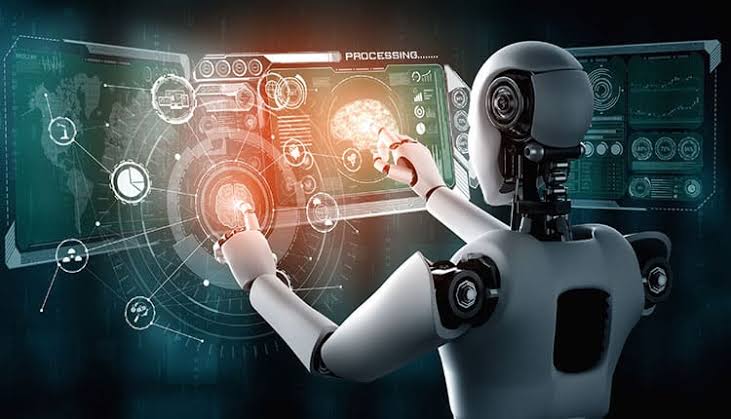
The Economic Impact of AI and Technological Advancements: Opportunities and Challenges
Artificial intelligence (AI) is no longer just a futuristic concept; it is a present reality that is reshaping industries and economies at an unprecedented pace. The rapid development and integration of AI technologies are driving significant growth opportunities across various sectors, but they also bring challenges that need to be carefully managed. As we navigate this transformative era, striking a balance between leveraging AI for economic growth and addressing its associated risks has become a critical concern for policymakers, businesses, and society as a whole.
The Growth Potential of AI
AI is revolutionising the way businesses operate, leading to increased efficiency, innovation, and productivity. From automating routine tasks to enhancing decision-making through data analytics, AI is enabling companies to achieve greater output with fewer resources. For example, AI-driven automation in manufacturing has streamlined production processes, reduced operational costs, and improved product quality. Similarly, in healthcare, AI is being used to develop personalised treatment plans, predict patient outcomes, and even discover new drugs, thereby enhancing the quality of care and reducing costs.
The financial services sector is also experiencing significant benefits from AI. Advanced algorithms are being used to detect fraudulent transactions, assess credit risks, and manage investments more effectively. AI’s ability to process vast amounts of data in real-time allows financial institutions to make more informed decisions, improving their competitiveness in the global market. Furthermore, AI-driven customer service solutions, such as chatbots and virtual assistants, are enhancing customer experiences and reducing operational overheads.
According to a report by the World Economic Forum, the global AI market is expected to grow at a compound annual growth rate (CAGR) of 42.2% from 2023 to 2028. This rapid expansion is projected to contribute trillions of dollars to the global economy, with AI expected to generate $15.7 trillion by 2030. The economic potential of AI is undeniable, and countries that invest in AI research, development, and implementation are likely to reap substantial economic benefits.
Job Displacement and Economic Disparities
While AI offers immense growth opportunities, it also presents significant challenges, particularly in the labour market. The automation of tasks traditionally performed by humans is leading to job displacement in various industries. For instance, AI-driven robots and machines are replacing workers in manufacturing, logistics, and retail sectors, leading to concerns about unemployment and income inequality.
The World Economic Forum estimates that by 2025, AI and automation could displace 85 million jobs globally. However, it is also anticipated that these technologies will create 97 million new jobs, particularly in areas such as AI development, data analysis, and cybersecurity. The key challenge lies in ensuring that workers have the necessary skills to transition into these new roles. Without adequate retraining and upskilling programs, there is a risk that economic disparities will widen, with lower-skilled workers bearing the brunt of job displacement.
Moreover, the benefits of AI adoption are not evenly distributed across regions. Developed countries with advanced technological infrastructure and significant investment in AI research are likely to experience the most substantial economic gains. In contrast, developing countries may struggle to keep pace, exacerbating global inequality. Ensuring that the economic benefits of AI are shared equitably is crucial for fostering global economic stability.
According to a report by the World Economic Forum, the global AI market is expected to grow at a compound annual growth rate (CAGR) of 42.2% from 2023 to 2028.
Financial System Vulnerabilities
The integration of AI into financial systems has the potential to enhance efficiency and decision-making, but it also introduces new risks. AI-driven trading algorithms, for example, can react to market fluctuations at speeds far beyond human capability, leading to increased market volatility. In extreme cases, these algorithms can trigger flash crashes, where stock prices plummet within seconds, causing widespread economic disruption.
Additionally, AI’s reliance on data makes financial systems vulnerable to cyberattacks. Hackers can exploit AI algorithms to manipulate data, disrupt trading activities, or steal sensitive financial information. As financial institutions increasingly depend on AI, ensuring the security and integrity of these systems becomes paramount. Policymakers and regulators must develop robust frameworks to address these vulnerabilities and protect the global financial system from potential AI-driven threats.
The Need for Balanced Regulation and Ethical AI
As AI continues to permeate various aspects of the economy, there is a growing need for balanced regulation that promotes innovation while safeguarding against its risks. Policymakers must strike a delicate balance between encouraging AI development and implementing safeguards to prevent negative societal impacts. This includes establishing ethical guidelines for AI use, protecting data privacy, and ensuring transparency in AI decision-making processes.
Furthermore, international cooperation is essential in addressing the global challenges posed by AI. Countries must collaborate to create standardised regulations and share best practices for AI governance. By working together, nations can harness the full potential of AI while minimising its risks, ultimately fostering a more inclusive and sustainable global economy.
Conclusion
The rapid development of AI and technological advancements is transforming industries and economies, offering significant growth opportunities while presenting substantial challenges. As AI continues to evolve, it is crucial for policymakers, businesses, and society to navigate these changes thoughtfully and responsibly. By leveraging AI for economic growth while addressing its risks, we can create a future where AI benefits all, fostering global prosperity and reducing inequality.
In this era of technological transformation, the choices we make today will shape the economic landscape of tomorrow. Balancing innovation with ethical considerations and equitable distribution of AI’s benefits will be key to ensuring that the global economy thrives in the age of AI.
Riya Kothavale is a Research Fellow at the Sixteenth Council



